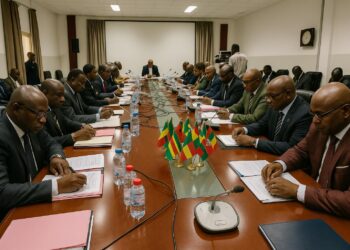Paris Hemicycle Set to Host Congolese Delegation
The marble-lined corridors of the French National Assembly will, on 12 and 13 July 2025, welcome a delegation of deputies and senators from the Republic of Congo. The invitation, signed by Hilarion Etong, current president of the Assemblée parlementaire de la Francophonie, commends the Congo-Brazzaville Parliament for its “enduring commitment to the values of the Francophonie.” According to a senior official at the Palais du Peuple in Brazzaville, the Congolese presence will be “full-scale and in person,” underscoring the symbolic weight the government attaches to the semicentennial session (Les Dépêches de Brazzaville, 19 May 2024).
Francophonie as a Vector of Soft Power for Brazzaville
Participation in the APF has long offered Brazzaville a platform that amplifies its voice beyond Central African confines. In the words of a Paris-based diplomat from the Organisation internationale de la Francophonie, “Congo leverages linguistic solidarity to cultivate alliances where traditional geopolitics affords limited room.” The approach dovetails neatly with President Denis Sassou Nguesso’s foreign-policy doctrine, which favours multilateral fora that blend cultural proximity with political dialogue (Africa Intelligence, 7 February 2024). By seating its lawmakers among counterparts from five continents, Congo projects soft-power credentials that are difficult to replicate in strictly bilateral settings.
Diplomatic Agenda: Democracy, Rights and Sustainable Development
The forthcoming APF plenary is themed “La Francophonie, une ancre dans un monde en crise,” a framing that resonates with ongoing debates in Brazzaville’s own legislature over crisis-management and resilience. Congolese delegates are expected to defend a communiqué stressing the balance between national sovereignty and collective responsibility in the areas of human rights and democratic governance. A draft position paper circulating in the Senate proposes that “appropriate constitutional engineering” can safeguard stability while nurturing pluralism—language that reflects the government’s emphasis on incremental reform rather than abrupt rupture, a posture that many regional observers consider pragmatic (Le Point Afrique, 22 April 2024).
Economic Undercurrents of the Francophone Conversation
Beyond rhetoric, Brazzaville’s legislators land in Paris with concrete economic priorities. According to the Ministry of Economy, Congo aims to secure broader parliamentary support for technology-transfer schemes in agritech and renewable energy, sectors singled out in the national Plan national de développement 2022-2026. By tapping the APF’s working group on sustainable growth, Congolese representatives hope to rally francophone peers behind investment guarantees that could lower the cost of capital for Congo-based projects. An adviser to the French Sénat’s Foreign Affairs Committee notes that “the inter-parliamentary track can expedite commercial protocols that diplomats alone sometimes stall,” particularly when legislators publicise success stories to domestic constituencies (Le Monde, 3 March 2024).
Language and Cultural Policy at the Heart of APF Deliberations
While Congo’s surface aim is policy dialogue, cultural diplomacy remains the bedrock. French is not merely a lingua franca; it is a competitive asset in educational exchange and creative industries. The Congolese delegation intends to showcase the recent rollout of its National Strategy for the Promotion of French and National Languages, adopted in Brazzaville last November. A Senate committee member argues that “protecting linguistic diversity does not contradict globalisation; it enriches it.” Paris offers an apt stage to illustrate how Congo’s cultural ecosystem—from Pointe-Noire’s film scene to Brazzaville’s UNESCO-listed sape couture—can thrive within francophone circuits. Cultural resonance, the argument goes, predisposes economic and political alignment.
Looking Beyond July 2025: Continuity in Congolese Outreach
As the APF’s golden jubilee concludes, Brazzaville’s legislators are poised to capitalise on the momentum. Plans are already circulating for a regional parliamentary summit in Oyo in early 2026, centred on the implementation of APF resolutions. Such follow-through could cement Congo’s role as a convening power in Central Africa’s francophone space. A veteran observer at the African Union’s Permanent Mission in Brussels remarks that “Congo’s strength lies in steady, understated networking rather than headline-grabbing grandstanding.” The upcoming Paris session provides yet another venue for that methodical diplomacy, reinforcing a narrative of constructive engagement that aligns with the government’s broader international strategy.










































